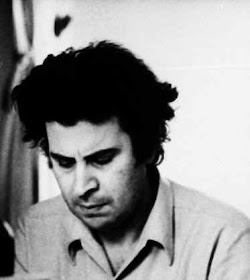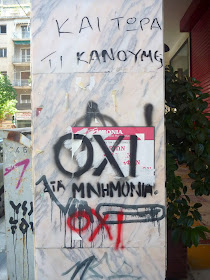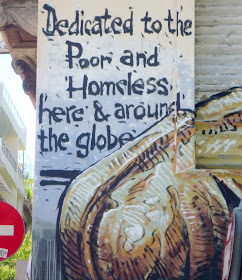Thousands flocked to the Megaron Mousikis, the Music Hall, on the 29th of August to celebrate the 90th birthday of Mikis Theodorakis.
We were early, and yet, the streets around the Megaron were packed. It took us quite a while to get to the garden where the concert was to take place
The garden is made up of a series of 'rooms' so it was impossible to see the whole crowd
which was so tightly packed that we could not see the stage - but the sound was good.
Theodorakis is much more than Greece's favourite composer. He has become a symbol of modern Greece, and the most beloved Greek public figure. His life mirrors the history of Greece in the 20th century and his life-long struggle for freedom, equality and justice epitomises the struggle of the Greek people.
Born on the island of Chios in 1925, he knew from very early on that he was going to become a composer. His political involvement started very early too. He fought during WWII and was captured in Tripoli. He was tortured and when he was set free he joined the partisan army of Greece, EAM, the National Liberation Movement, and took part in the civil war during 1945-49. Arrested, he was exiled on the island of Ikaria in 1947 and was then transferred to the island of Makronisos in 1948 where he was tortured again and barely survived. When he was released he moved to Paris to continue with his studies in music. He composed continuously.
After Lambrakis, an MP, was murdered, Theodorakis himself became an MP. During this time he wrote the score for Kostas Gavras' film Z, which is about the assassination of Lambrakis.
In 1967 when the junta seized power, Theodorakis founded the underground movement 'Patriotic Front'. He was arrested and held in a prison camp in Oropos. Following an international outcry he was released and exiled once more, abroad this time. His music was banned in Greece but people listened to it nevertheless, and it became an anthem of resistance. Meanwhile, while in exile in Europe, he called for resistance to the military dictatorship and for the restoration of democracy in Greece. Maria Farantouri, one of the artists who performed his songs and who was also in exile, has this to say about that time: 'during the military dictatorship in Greece and just before it, I started singing with Mikis and all of our songs had to do with social justice, peace, solidarity and humanity'.
Immediately after the fall of the junta, Theodorakis returned to Greece as a politician in 1974. At that time his compositional work focussed mainly on numerous large-scale song cycles, including Epitaphios, Epiphania, The Hostage, Zorba the Greek, Romiossini, Songs of the Struggle, March of the Spirit, State of Siege, The Trojan Women, Axion Esti,

Mauthausen (about the Nazi concentration camp)

and Canto General (poetry by Pablo Neruda).
He has put to music the work of leading poets, such as Odysseas Elytis, Pablo Neruda, Brendan Behan, Federico Garcia Lorca, George Seferis and Yannis Ritsos. He has composed the national anthem of Palestine. He has become a symbol of resistance proving that music has no borders. Throughout his life, he has remained true to his principles, has never compromised and has fought during Greece's darkest and most difficult times always hoping for a brighter future. No wonder he is such a loved and respected figure in Greek public life.
Theodorakis has composed over 1000 songs. His repertoire also includes operas, film scores and symphony music. Orestia, Missa Greca, Canto Olympico, Medea, Elektra and Antigone are some examples of his work after the 1970s.
His political involvement has never wavered. The last demonstration he participated in was on February 12, 2012 along with Manolis Glezos, a Syriza MP and the guy who at 19, during the Nazi occupation of Greece, took the swastika down from the Acropolis and raised the Greek flag. 'Glezos was walking, I was in a wheelchair. It was a rally against austerity, which was what pushed us into the present misery. Then the police threw tear gas and I got some in the face because I had stood up to see and I fell back in the wheelchair. Some young people tried to help me and they put a gas mask on my face, but it was too late. My lungs suffered great damage and I had to stay in bed for weeks. I'm not the young Mikis anymore'. He is still suffering from the after effects of that 'encounter' with the chemicals.
Yesterday, the day after the concert, Theodorakis and other public figures have signed a letter asking for the third bailout agreement to be reversed in line with the wishes of the Greek people who voted an overwhelming OXI to a new memorandum.

The concert was disappointing. It was bland. The rich political life and activism of the composer, the things that mostly define him, were not mentioned and the singing was mediocre and did absolutely no justice to the richness and complexity of the music. Even though it was good to hear some of the favourites we cringed at how badly they were performed, and in fact, we left before the end.
I will post some of my favourites in the next post, as this post is already too long.
There were celebrations in other parts of Greece too. In Hania, Crete, thousands of people formed a human chain in the area of the Old Harbour and danced to the music of Zorba the Greek. (Image taken from here )























































